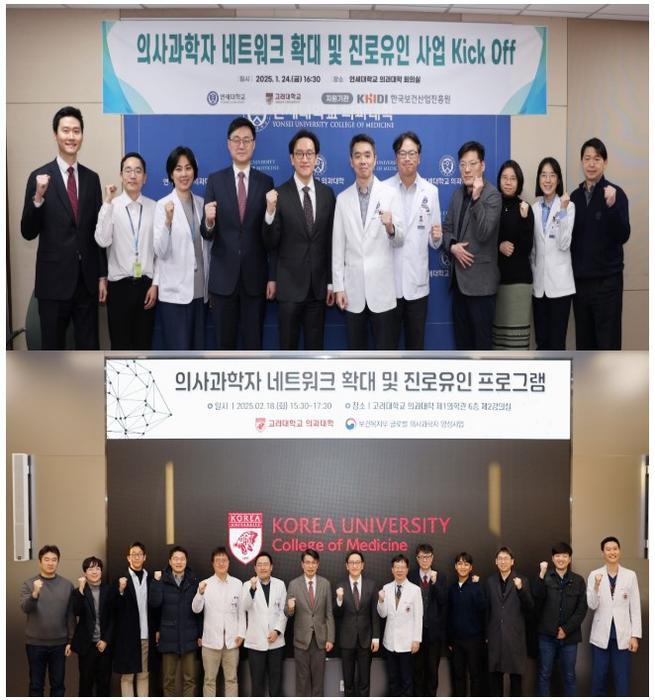Korea University College of Medicine and Yonsei University College of Medicine have embarked on an ambitious initiative aimed at revolutionizing the training of physician-scientists within South Korea. This program is not merely a collaboration; it is a strategic global R&D network project designed to attract and nurture the next generation of medical researchers capable of bridging the gap between clinical practice and scientific inquiry. The endeavor comes at a critical time when the need for well-rounded physician-scientists is more pronounced than ever, as the healthcare landscape evolves towards more integrated, research-driven approaches.
To initiate this collaborative venture, both institutions have structured their program around the “Physician-scientist Network Expansion and Career Attraction Program,” supported by the Ministry of Health and Welfare. This collaboration is far-reaching, encompassing various facets of educational exchange, career development, and inter-institutional partnerships. The essence of this initiative is to create a robust framework that fosters global connectivity among aspiring physician-scientists and seasoned researchers alike.
One of the primary objectives of this program is to build a comprehensive global exchange network. This network will serve as a conduit for knowledge sharing, peer support, and collaborative research endeavors, which are essential components in the education and training of young physician-scientists. The inclusion of international researchers and institutions will provide South Korean students with unparalleled access to diverse methodologies and innovative practices being implemented in other parts of the world.
The initiative also aims to enhance networking opportunities by partnering with excellent researchers from around the globe. By facilitating exchanges and collaborations with eminent overseas physician-scientists, the program allows for a rich exchange of ideas, which is fundamental for the development of critical thinking and problem-solving skills that are inherent to scientific inquiry. This kind of mentoring is invaluable for young medical professionals who must navigate the complexities of both clinical and research environments.
Participation in international conferences and performance exchange events forms another core component of this program, which aims to provide young domestic physician-scientists with exposure to global scientific discussions. These platforms will not only serve to amplify the voices of young researchers but also provide insights into cutting-edge research. Through these interactions, participants can glean experiences and lessons from established professionals within the field, thereby gaining essential context for their future work.
Additionally, the colleges plan to offer short-term overseas training opportunities at reputed global research institutes for domestic undergraduate medical students. This facet of the program is pivotal, as real-world experience in leading international research facilities will equip students with a competitive edge. The emphasis on hands-on experience ensures that they are not only consumers of knowledge but also contributors to the global scientific dialogue.
Competitions designed for trainees will further incentivize participation, creating an atmosphere of healthy rivalry while encouraging excellence. This approach will stimulate the development of innovative research ideas, opening doors for groundbreaking findings and contributions to the medical literature. The architecture of the program is deliberately designed to sustain a high level of engagement among students and faculty alike.
Through these combined efforts, Korea University College of Medicine and Yonsei University College of Medicine aspire to elevate the quality of education, research, and training for domestic physician-scientists. The initiative intends to expand career pathways and increase the number of qualified candidates who choose to pursue this dual-track career, effectively blending clinical practice with rigorous scientific research.
In addressing the broader implications of the project, it’s essential to recognize that the future of healthcare increasingly relies on the competencies of physician-scientists. These professionals serve as critical links between laboratory research and patient care, translating science into practical applications that can improve therapeutic outcomes. Therefore, empowering young medical students to explore this career trajectory is of paramount importance.
Korea University College of Medicine has already laid a solid foundation for physician-scientist training programs extending from medical school to specialist training. Their collaboration with prestigious institutions such as Johns Hopkins University and Yale University demonstrates a commitment to global leadership in medical education. The joint master’s and doctoral programs with these universities offer unparalleled training opportunities in both basic and clinical science, preparing students for multifaceted roles in medicine.
Yonsei University College of Medicine has also instituted various training programs that cater to the development of independent researchers. Initiatives like the Yonsei physician-scientist training program and convergent training supported by the Korea Health Industry Development Institute are indicative of the college’s proactive approach to nurturing future leaders in the sciences. Continuous support for academic growth through structured programs prepares students for the evolving demands of the biomedical landscape.
Prominent figures from these institutions have articulated their vision for future training, expressing optimism about the potential of this collaborative project. Professor Lim Beom-Jin from Yonsei highlighted the significance of guiding students toward the physician-scientist path in order to enhance the nation’s competitiveness in medical science. Meanwhile, Professor Roh Jee-Hoon from Korea University emphasized the importance of creating a sustainable network of global physician-scientists, reiterating the program’s commitment to qualitative growth in training methodologies.
In conclusion, the joint R&D network project is set to reshape the educational landscape for physician-scientists in South Korea. As these institutions continue to synergize their efforts, the future looks promising for aspiring medical professionals who seek to emerge as leaders at the intersection of medicine and science. By laying the groundwork for innovation and collaboration, they are collectively working towards enhancing the prospects of not just their students, but the entire medical community.
Subject of Research:
Article Title: Joint Research Project to Train New Korean Physician-scientists
News Publication Date: [Insert date]
Web References: [Insert links]
References: [Insert references]
Image Credits: KU Medicine
Keywords: Scientific community, Education, Students, College students, Doctoral students, Undergraduate students, Scientific collaboration, Health care industry




